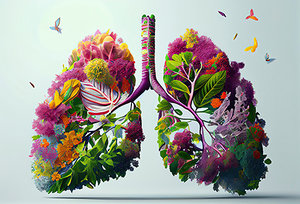Good for Lung Health
By Editorial Staff
Breathing is so natural and so constant that we usually don't even think about it – until it's compromised, either voluntarily or involuntarily. The voluntary scenario – holding your breath underwater, etc.
– isn't problematic; the involuntary scenario – a health issue directly or indirectly involving the lungs – certainly is. With that said, let's focus on lung health and why omega-3 fatty acids appear promising for optimizing lung function as we get older.
Researchers conducted a two-part investigation designed to evaluate how omega-3 fatty acids influenced lung health. In the first part, they evaluated just over 15,000 U.S. adults enrolled in a National Heart, Lung and Blood Institute (NHLBI) study – a group of studies funded by the National Institutes of Health. Participants were generally healthy, absent of major chronic lung disease, and an average age of 56 at baseline. Researchers tracked them for an average of seven years, finding that higher levels of omega-3 fatty acids in the bloodstream correlated with a reduced rate of lung function decline. The best omega-3 for lung health? DHA (docosahexaenoic acid).
 Part 2 of the study involved genetic data analysis from a study of 500,000-plus patients from the UK Biobank, a long-term, ongoing study "investigating the respective contributions of genetic predisposition and environmental exposure to the development of disease."The researchers found that genetic blood markers representative of dietary omega-3 levels also were associated with preserved lung function. Findings from both parts of the investigation appear in the American Journal of Respiratory and Critical Care Medicine.
Part 2 of the study involved genetic data analysis from a study of 500,000-plus patients from the UK Biobank, a long-term, ongoing study "investigating the respective contributions of genetic predisposition and environmental exposure to the development of disease."The researchers found that genetic blood markers representative of dietary omega-3 levels also were associated with preserved lung function. Findings from both parts of the investigation appear in the American Journal of Respiratory and Critical Care Medicine.
Lung health isn't the only reason to ensure you get adequate omega-3 fatty acids in your diet or via supplementation. Heart health is another big one. Talk to your doctor for more information.

